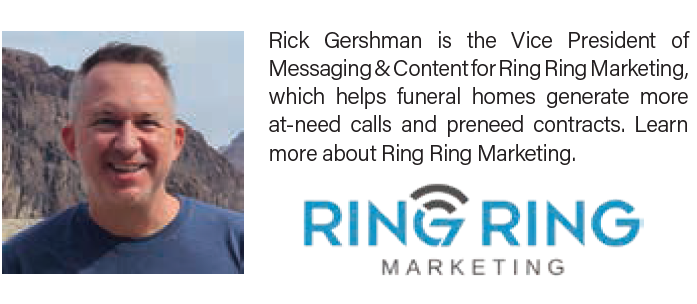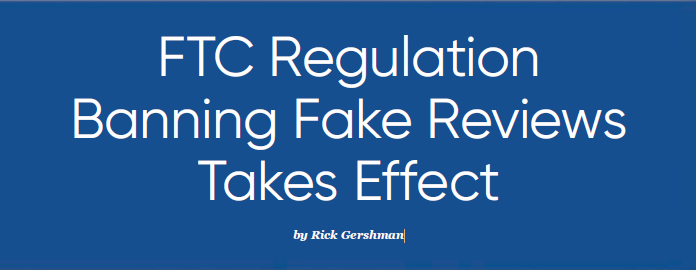(404) 312-6640
FTC Regulation Banning Fake Reviews Takes Effect
On Oct. 21, as many funeral directors were attending the NFDA Annual Convention and Expo in New Orleans, a critical piece of government regulation went into effect. This change affects businesses across America, including funeral homes.
Its technical name is The Trade Regulation Rule on the Use of Consumer Reviews and Testimonials (Final Rule). For simplicity, we’ll just call it the Final Rule.
The main aspect of this new regulation is that it bans marketers from employing fake reviews. Beyond that, it has many components. Here are some of the practices the FTC
now prohibits marketers and businesses from employing:
• Using reviews written by “nonhumans”
• Paying for positive reviews to falsely boost a product or service
• Paying for negative reviews to falsely denigrate a product or service
• Exaggerating actual influence by (for example) paying for bots to artificially inflate follower count
• Hiding or otherwise suppressing negative reviews from consumers
• Discouraging consumers from posting negative reviews
This is a big deal, because online reviews are incredibly important to your funeral home. Most families take at least a cursory look at your firm’s overall review score, particularly on Google, before deciding to call you. And that’s true even if they’ve received a personal recommendation.
Quite simply, you’re not going to win the call over your competitor, in most cases, unless your online reviews are comparatively stronger.
Of course, the same is true of all small businesses today. And unfortunately, that creates an environment in which less ethical businesses are incentivized to generate fake fivestar reviews.
It’s easy to do, given that lots of sketchy digital marketers are happy to create fake positive reviews for a fee. The internet is currently flooded with fake reviews for services and products on platforms including Google, Yelp, Facebook, Amazon, Instagram, and X (formerly Twitter).
Additionally, the recent meteoric rise of artificial intelligence (AI) to generate fake reviews, along with “influencer marketing,” in which popular social media influencers are paid huge sums to promote products without acknowledging that compensation, has created a misinformation nightmare for consumers.
“Fake reviews not only waste people’s time and money, but also pollute the marketplace and divert business away from honest competitors,” FTC Chair Lina Khan said regarding the ban. Frankly, many of these tactics have been going on for a while, and it’s really been the rise of AI that pushed the FTC into action. Over the past year, many more advertisers have employed automated chatbots such as ChatGPT to quickly generate user reviews for products (and sometimes services) sold online.
So how does this affect funeral homes such as yours?
Everything starts with your online reputation. If you don’t already have a significant quality and quantity of reviews, there’s no point to investing in SEO, pay-per-click (PPC) ads, Google’s Local Service Ads (LSAs) or anything else.
Those are all incredibly powerful marketing tools, but they won’t help at all if you have a 2.8 average review rating on Google! You must get your online reputation in order first.
Unfortunately, that’s exactly what incentivizes less ethical businesses to create fake reviews. If your competitors are doing it, it’s understandably hard to resist.
Remember when Major League Baseball had its “Steroid Era” (mostly in the 1990s and 2000s)? Athletes who didn’t use steroids and other performance-enhancing drugs found themselves at a massive disadvantage to the ones who did.
It was completely unfair, not a level playing field. Many players who used steroids got huge contracts and/or were able to extend their careers, whereas many players who eschewed steroids and played by the rules found themselves relegated to the minor leagues or out of the game entirely.
MLB eventually dealt with the problem, and now drug testing is a standard practice in professional baseball and many other sports. But that only came after a lot of damage was done. With its ban on fake reviews, the FTC is hoping to mitigate damage to ethical businesses much faster.
Thankfully, this problem isn’t nearly as pervasive in funeral service as it is in other professions and industries, but that doesn’t mean it’s entirely absent.
Let’s be honest: Who hasn’t looked at their firm’s average Google review score and pondered whether to have a few friends or family members—even if they weren’t clients—post a five-star review? Seems like a quick and easy way to bump up that score a bit.
As online reputation has rapidly become much more critical for generating at-need calls and preneed leads, there’s an understandable temptation to play a little loose with the rules.
The post-pandemic “pull-forward effect” is real. Cremation rates continue to rise, depressing per-call revenue. It’s tough out there! The difference between a 4.4 average review rating on Google and a 4.7 can be massive: The latter could help you receive 40, 50, even 60 more calls every year.
Obviously, I’m not suggesting anyone should artificially boost their review scores. Even before this FTC announcement, that’s what marketers refer to as “black-hat” tactics: illegitimate, sometimes even illegal, ways of promoting your business.
At the agency I work for (Ring Ring Marketing), we exclusively use “white-hat” (ethical and legal) strategies, and I’m certain the vast majority of funeral directors, who have dedicated their lives to helping families in grief, subscribe to the same standard.
Regardless, the FTC’s “Final Rule” is excellent news for all businesses who do things the right way. It clarifies what is allowed and what is not. It ensures a level playing field for everyone. Which is critical, because unless a particular practice is defined as literally illegal, there will always be a few shady marketers willing to push envelope.
Let’s take a moment to reflect on the earlier bullet point about the FTC outlawing “paying for negative reviews to falsely denigrate a product or service.” Yes, that’s a real thing. Some businesses literally pay for fake one-star reviews of their competitors, a frankly monstrous practice.
Again, this very rarely occurs in the funeral profession, but it does happen, and the Final Rule is a big step toward eliminating it.
Additionally, businesses who partner with a marketing firm sometimes employ fake reviews without even knowing (or condoning) it. Dubious marketing firms might present themselves as legitimate but actually employ black-hat tactics without their clients’ knowledge.
If your funeral home employs a marketing firm, it’s critical to immediately ask whether those marketers are using any of these now-illegal strategies. If you don’t get an answer you trust, this would be a good time to find someone else.
According to the Final Rule, the FTC is authorized to penalize fraudulent or deceptive reviews by seeking civil penalties of up to $51,744 per violation.
Can your funeral home afford to pay over $50K for a single violation? How about multiple violations? Being hit with 10 violations would add up to over a half-million dollars in penalties.
If you have any concerns about whether you might be violating the FTC’s Final Rule (innocently or otherwise), now is the time to ensure your online reputation strategies fully adhere to its requirements. Editor’s note: A version of this article appeared in the Sept. 2 edition of FuneralVision.com and is reprinted here with permission.
As online reputation has rapidly become much more critical for generating at-need calls and preneed leads, there’s an understandable temptation to play a little loose with the rules.
The post-pandemic “pull-forward effect” is real. Cremation rates continue to rise, depressing per-call revenue. It’s tough out there! The difference between a 4.4 average review rating on Google and a 4.7 can be massive: The latter could help you receive 40, 50, even 60 more calls every year.
Obviously, I’m not suggesting anyone should artificially boost their review scores. Even before this FTC announcement, that’s what marketers refer to as “black-hat” tactics: illegitimate, sometimes even illegal, ways of promoting your business.







Comments